|
Books Should Be Free Loyal Books Free Public Domain Audiobooks & eBook Downloads |
|
|
Books Should Be Free Loyal Books Free Public Domain Audiobooks & eBook Downloads |
|
Non-fiction |
|---|
|
Book type:
Sort by:
View by:
|
By: John Bunyan (1628-1688) | |
|---|---|
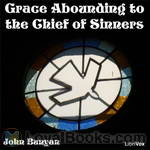 Grace Abounding to the Chief of Sinners
Grace Abounding to the Chief of Sinners
Grace Abounding is the spiritual autobiography of John Bunyan, who also penned Pilgrim’s Progress, perhaps one of the most significant pieces of Christian literature, second only to the Bible. Grace Abounding follows Bunyan’s struggle to find true repentance and forgiveness, his battle with Satan’s temptations of unbelief, his comfort found in the Bible and his overarching victory gotten by the grace of God through Jesus Christ his Son. Readers familiar with Pilgrim’s Progress will recognize... | |
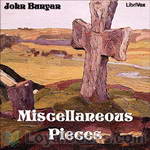 Miscellaneous Pieces
Miscellaneous Pieces
John Bunyan (November 28, 1628 – August 31, 1688), a Christian writer and preacher, was born at Harrowden (one mile south-east of Bedford), in the Parish of Elstow, England. He wrote The Pilgrim’s Progress, arguably the most famous published Christian allegory. In the Church of England he is remembered with a Lesser Festival on 30 August. Bunyan became a popular preacher as well as a prolific author, though most of his works consist of expanded sermons. In theology he was a Puritan, but there was nothing gloomy about him. The portrait his friend Robert White drew, which has often been reproduced, shows the attractiveness of his true character. | |
By: John Burroughs (1837-1921) | |
|---|---|
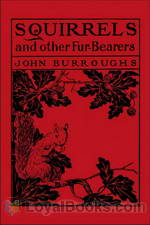 Squirrels and other Fur-Bearers
Squirrels and other Fur-Bearers
Squirrels and other Fur-Bearers, a collection of essays by American naturalist and essayist, John Burroughs, provides fascinating insight into the daily life of small woodland creatures. Included in these essays are Burrough’s personal observations of squirrels, rabbits, mink, and chipmunks, as well as numerous other small mammals. Highly recommended for anyone, both young and old, with an interest in nature and wildlife! | |
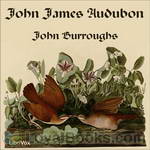 John James Audubon
John James Audubon
Audubon’s life naturally divides itself into three periods: his youth, which was on the whole a gay and happy one, and which lasted till the time of his marriage at the age of twenty-eight; his business career which followed, lasting ten or more years, and consisting mainly in getting rid of the fortune his father had left him; and his career as an ornithologist which, though attended with great hardships and privations, brought him much happiness and, long before the end, substantial pecuniary rewards. | |
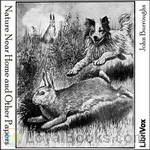 Nature Near Home and Other Papers
Nature Near Home and Other Papers
Nature Near Home is one of many books on natural history by John Burroughs. It is full of simple observations about rural scenes and charming stories about animals, plants, and even people! Burroughs loves the creatures around him and derives great pleasure from his walks and studies in nature’s scenes. | |
 Birds and Bees, Sharp Eyes, and Other Papers
Birds and Bees, Sharp Eyes, and Other Papers
Probably no other American writer has a greater sympathy with, and a keener enjoyment of, country life in all its phases—farming, camping, fishing, walking—than has John Burroughs. His books are redolent of the soil, and have such "freshness and primal sweetness," that we need not be told that the pleasure he gets from his walks and excursions is by no means over when he steps inside his doors again. As he tells us on more than one occasion, he finds he can get much more out of his outdoor experiences by thinking them over, and writing them out afterwards... | |
By: John Calvin (1509-1564) | |
|---|---|
 Institutes of the Christian Religion
Institutes of the Christian Religion
Institutes of the Christian Religion is John Calvin’s seminal work on Protestant systematic theology. Highly influential in the Western world and still widely read by theological students today, it was published in Latin in 1536 and in his native French in 1541, with the definitive editions appearing in 1559 (Latin) and in 1560 (French). The book was written as an introductory textbook on the Protestant faith for those with some learning already and covered a broad range of theological topics... | |
 Commentary on the Epistles of Paul the Apostle to the Corinthians, Volume 1
Commentary on the Epistles of Paul the Apostle to the Corinthians, Volume 1
John Calvin was an influential French theologian and pastor during the Protestant Reformation. Calvin's writing and preachings provided the seeds for the branch of theology that bears his name. Originally trained as a humanist lawyer, he broke from the Roman Catholic Church around 1530. After religious tensions provoked a violent uprising against Protestants in France, Calvin fled to Switzerland. Calvin developed his theology in his biblical commentaries as well as in his sermons and treatises. Calvin produced commentaries on most of the books of the Bible... | |
By: John Cargill Brough (1834-1872) | |
|---|---|
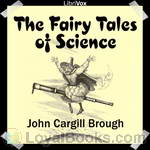 The Fairy Tales of Science
The Fairy Tales of Science
This book, written in the mid 19th century and illustrated by Charles H. Bennett, provides an entertaining introduction to topics in science for children. In each chapter, the author uses a popular myth or fairy tale to lay the groundwork for an equally fascinating "fairy tale of science" full of interesting facts and real life examples. | |
By: John Casper Branner | |
|---|---|
 A Brief Grammar of the Portuguese Language
A Brief Grammar of the Portuguese Language
Dr. Branner was a recognized authority on the geology of South American republics, especially Brazil, having organized and headed the Stanford Expedition to Brazil in 1911, among others. In 1910 he published this "little book", as the author himself calls it, for the use of English-speaking students who needed a fast and practical way of learning Portuguese. Contrary to the belief of many back then, John C. Branner claims that Brazilian Portuguese isn't "badly spoken Portuguese", and, even though using examples from both Portuguese and Brazilian writers, seems to give more proeminence to Brazilian Portuguese. | |
By: John Charles Van Dyke (1856-1932) | |
|---|---|
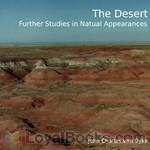 The Desert, Further Studies in Natural Appearances
The Desert, Further Studies in Natural Appearances
The Desert by John Charles Van Dyke, published in 1901, is a lush, poetic description of the natural beauty of the American Southwest. "What land can equal the desert with its wide plains, its grim mountains, and its expanding canopy of sky!" Van Dyke, a cultivated art historian, saw "sublimity" in the desert's "lonely desolation," which previous generations had perceived only as a wasteland, and his book has a conservationist flavor which seems distinctly modern. "The deserts should never be reclaimed," he writes... | |
By: John Clay Coleman | |
|---|---|
 Jim Crow Car; Or, Denouncement of Injustice Meted Out to the Black Race
Jim Crow Car; Or, Denouncement of Injustice Meted Out to the Black Race
"My opposition to injustice, imposition, discrimination and prejudice, which have for many years existed against the colored people of the South, has led to this little book. In many parts of America the press has been furnished with “matter” for defending the colored people, through the medium of “Coleman’s Illustrated Lectures.” By request of my many auditors, some of whom being leading elements of the Northern States and Canada, this volume is published. Many persons interested in the welfare of the negro, have sought a more elaborate book on the Southern horrors... | |
By: John Clement Reville (1867-?) | |
|---|---|
 The First American Sister of Charity: Elizabeth Bayley Seton
The First American Sister of Charity: Elizabeth Bayley Seton
This is a picturesque and moving account of the life and work of Elizabeth Ann Bayley Seton (1774-1821), the first native-born citizen of the United States to be canonized a saint by the Roman Catholic Church. This widowed mother of five established schools in New York and Maryland and was the first to found a congregation of Religious Sisters in the United States, the Sisters of Charity of St. Joseph, whose motherhouse stands today in Emmitsburg, Maryland. | |
By: John Cordy Jeaffreson (1831-1901) | |
|---|---|
 A Book About Lawyers
A Book About Lawyers
| |
By: John Cowper Powys and Llewelyn Powys (1872-1963) | |
|---|---|
 Confessions of Two Brothers
Confessions of Two Brothers
A short self portrait of Powys’ beliefs, temperament and peculiarities which prefigures his later, greater Autobiography. | |
By: John D. Rockefeller (1839-1937) | |
|---|---|
 Random Reminiscences of Men and Events
Random Reminiscences of Men and Events
A good book by the oil revolutionist of the 20th century. As they say "Men should listen to experience" and this book is all about the experience of the second highest taxpayer of the US during the 20's. Though it is not in the book, this is a small poem he wrote:I was early taught to work as well as play,My life has been one long, happy holiday;Full of work and full of play-I dropped the worry on the way- And God was good to me everyday. | |
By: John Dewey (1859-1952) | |
|---|---|
 Democracy and Education: an introduction to the philosophy of education
Democracy and Education: an introduction to the philosophy of education
| |
 The Child and the Curriculum
The Child and the Curriculum
| |
 Moral Principles in Education
Moral Principles in Education
| |
 Democracy and Education: An Introduction to the Philosophy of Education
Democracy and Education: An Introduction to the Philosophy of Education
An important, controversial, and often cited work on public education. Dewey discusses the role of public education in a democracy and the different methods for achieving quality in education. After its initial publication, this book began a revolution in educational thinking; one that emphasized growth, experience, and activity as key elements in promoting democratic qualities in students and educators alike. (Introduction by timferreira) | |
 Human Nature And Conduct - Part 1, The Place of Habit in Conduct
Human Nature And Conduct - Part 1, The Place of Habit in Conduct
John Dewey, an early 20th Century American philosopher, psychologist, educational theorist saw Social Psychology as much a physical science as Biology and Chemistry. This project encompasses Part 1 of 4 of his book Human Nature and Conduct. Dewey's uses the word "HABIT" as a specialized catch-all word to describe how a person and his/her objective environment interact. This interaction is the basis for moral judgement. Dewey writes: "All habits are demands for certain kinds of activity; and they constitute the self.” In other places he also asserts that "Habits are Will." - Summary by William Jones, Soloist | |
By: John Donne (1572-1631) | |
|---|---|
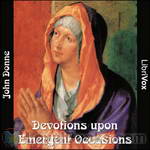 Devotions upon Emergent Occasions
Devotions upon Emergent Occasions
Devotions upon Emergent Occasions is a 1624 prose work by the English writer John Donne. It is a series of reflections that were written as Donne recovered from a serious illness, believed to be either typhus or relapsing fever. (Donne does not clearly identify the disease in his text.) The work consists of twenty-three parts describing each stage of the sickness. Each part is further divided into a Meditation, an Expostulation, and a Prayer. The seventeenth meditation is perhaps the best-known part of the work... | |
By: John E. (John Edwards) Russell (1834-1903) | |
|---|---|
 Rational Horse-Shoeing
Rational Horse-Shoeing
| |
By: John Evelyn (1620-1706) | |
|---|---|
 Sylva, Vol. 1 (of 2) Or A Discourse of Forest Trees
Sylva, Vol. 1 (of 2) Or A Discourse of Forest Trees
| |
 Acetaria: A Discourse of Sallets
Acetaria: A Discourse of Sallets
| |
By: John F. (John Fairfield) Dryden (1839-1911) | |
|---|---|
 The American Type of Isthmian Canal Speech by Hon. John Fairfield Dryden in the Senate of the United States, June 14, 1906
The American Type of Isthmian Canal Speech by Hon. John Fairfield Dryden in the Senate of the United States, June 14, 1906
| |
By: John Farrar (1896-1974) | |
|---|---|
 Bookman, March 1921
Bookman, March 1921
This precursor to The New Yorker magazine features several Algonquin Roundtable regulars, including Broun, Woolcott, and Morley. Editor is John C. Farrar, an American editor, writer and publisher. Farrar founded two publishing companies — Farrar & Rinehart and Farrar, Straus and Giroux. | |
By: John Fiske (1842-1901) | |
|---|---|
 The Unseen World and Other Essays
The Unseen World and Other Essays
| |
By: John Flavel (1627-1691) | |
|---|---|
 Divine Conduct, or the Mystery of Providence
Divine Conduct, or the Mystery of Providence
Shows God's providence in every aspect of our lives. - Summary by RuthP | |
By: John Foxe | |
|---|---|
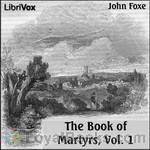 Foxe's Book of Martyrs, A History of the Lives
Foxe's Book of Martyrs, A History of the Lives
The Book of Martyrs, by John Foxe, is an English Protestant account of the persecutions of Protestants, many of whom had died for their beliefs within the decade immediately preceding its first publication. It was first published by John Day, in 1563. Lavishly illustrated with many woodcuts, it was the largest publishing project undertaken in Britain up to that time. Commonly known as, “Foxe’s Book of Martyrs”, the work’s full title begins with “Actes and Monuments of these Latter and Perillous Days, Touching Matters of the Church... | |
By: John Franklin Bobbitt | |
|---|---|
 What the Schools Teach and Might Teach
What the Schools Teach and Might Teach
| |
By: John Frederick Bligh Livesay (1875-1944) | |
|---|---|
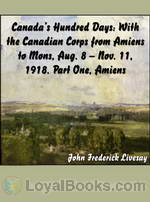 Canada's Hundred Days: With the Canadian Corps from Amiens to Mons 1918
Canada's Hundred Days: With the Canadian Corps from Amiens to Mons 1918
This is the incredible story of the actions of the men and women of the Canadian Expeditionary Force, Canada’s contribution to the Great War 1914-1919, during the last 100 days of the First World War. After nearly 4 years of stalemate (trench warfare) the Allied Forces planned to break through the German Hindenburg Line and then push the enemy from their defensive positions. You will follow the CEF as they take Amiens (Part One), Arras (Part Two), Cambrai (Part Three) and then the pursuit of the German Forces from Valenciennes to Mons (Part Four) in Belgium, the same place where the war began on August 4, 1914, on November 11, 1918. | |